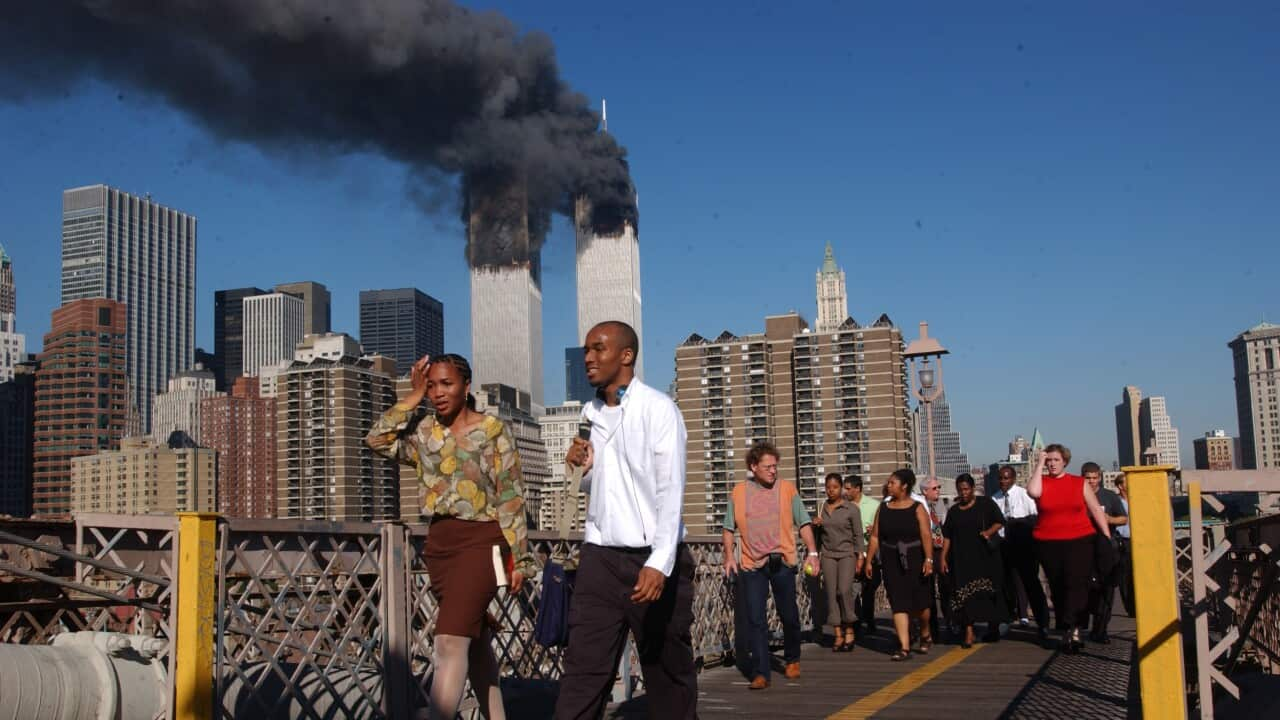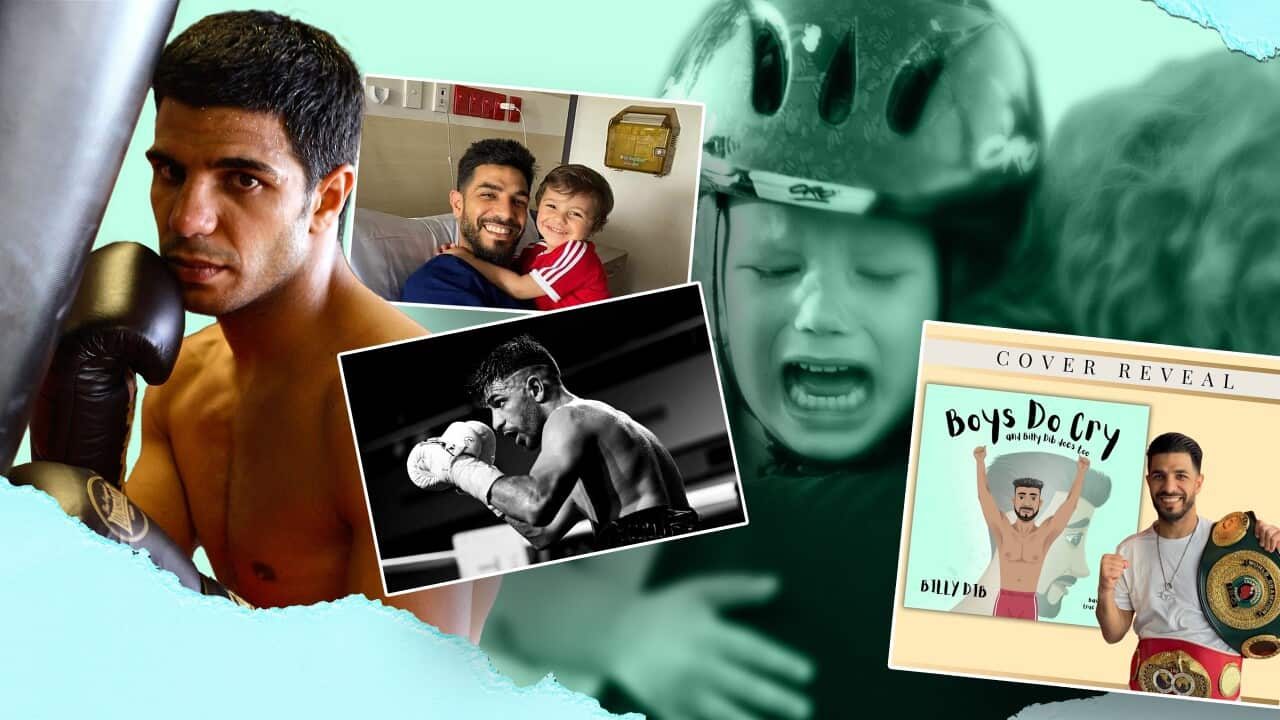The repercussions of the attacks on New York City and Washington DC on September 11, 2001, were felt beyond US borders and affected the lives of people in more than one country.
Close to 3000 people lost their lives during the horrific attacks on the US in scenes that shocked the world over.
Highlights:
- Arab Council Australia head Randa Kattan says community groups are still trying to "minimise the damage" stemming from the attacks.
- Islamophobia stemming from post-9/11 sentiments continue to this day, she believes.
- Arab Council Australia chair Roland Jabbour is calling on governments to introduce stricter punishments for Islamophobic attacks.
Following those events, tens of thousands became displaced during the Coalition's 'war on terror' in Afghanistan, which came as a result of efforts to unseat the Taliban who harboured al-Qaeda, the militant organisation accused of conducting the 9/11 attacks. Two decades on, and after the US and its allies withdrew forces from Afghanistan, and as the Taliban rose back into power in that country, Muslim and Arab leaders in Australia say the events stemming from 9/11 continue to affect the younger members of the community here, impacting their identity, sense of belonging and affiliation with the country.
Two decades on, and after the US and its allies withdrew forces from Afghanistan, and as the Taliban rose back into power in that country, Muslim and Arab leaders in Australia say the events stemming from 9/11 continue to affect the younger members of the community here, impacting their identity, sense of belonging and affiliation with the country.

The twin towers of the World Trade Center burn in New York. Source: AP
For Roland Jabbour, chair of the Arab Council Australia, the heart-wrenching effects of 9/11 were felt significantly hard.
"There is no doubt that it was a shocking event, and it had terrible effects on all levels, particularly locally in Australia on the Arab community," he says. It’s a sentiment shared by Randa Kattan, the executive director of the Arab Council Australia.
It’s a sentiment shared by Randa Kattan, the executive director of the Arab Council Australia.

Rescue workers sift through the wreckage of the World Trade Center September 13, 2001. Source: Getty Images North America
"This incident affected us a lot, and we are still struggling after everything that happened and trying to minimise the damage.” Jalila Abdul Salam, the Queensland-based president of the Muslim Women's Association, remembers the aftermath of the attacks very clearly.
Jalila Abdul Salam, the Queensland-based president of the Muslim Women's Association, remembers the aftermath of the attacks very clearly.

Arab Council of Australia CEO Randa Kattan. Source: AAP
"The first reaction I experienced after the events were from the neighbours of the centre where we worked.
“They were shouting, 'Get out of here and go back where you came from'.”
For Ms Abdul Salam, the attacks saw a rise in negative perceptions of Arabs and Muslims, which she believes was fanned by factions within the global and Australian media.
As a result, she says a rise in Islamophobia and misunderstanding was experienced by the diasporas in Australia, with elements enduring to this day.
Racism in the modern day is "hidden under the shell", she believes.
“95 per cent of Australian society is ignorant to what Islam and Muslims are and relies on its opinions from the media,” she says.
We fear that they base their knowledge on information that comes from extremist associations or organisations that confuse Islam and Muslims.
A 2004 Human Rights and Equal Opportunity report found that more than two-thirds of Australian Muslims and Arabs said they experienced racism or hate speech stemming from the attacks of September 11.
The were described by community leaders as acts of "anti-Arab racism" and then New South Wales Premier Morris Iemma, who said the violence exposed "the ugly face of racism in this country". Ms Kattan believes the riots were fuelled by the sentiments stemming from 2001.
Ms Kattan believes the riots were fuelled by the sentiments stemming from 2001.

A police officer tries to protect a man from being punched during the Cronulla riots. Source: AAP
"These events affected the youth in the community with a sense of identity disorder, and for twenty years we have been working to repair what the events destroyed," she says.
Around 90 per cent of the participants in the Human Rights and Equal Opportunity report were women who experienced racist abuse or violence, especially veiled members of the community.
Maha Abdo, the former president of the Muslim Women's Association, recalls two incidents of prejudice directed at Muslim women in Sydney. The first was "of a man who threw a lit cigarette into a car of a veiled woman and set her Hijab on fire”, while the second was when she was driving a van carrying several veiled female passengers, which was “chased by a man in his car in an attempt to cause us an accident”.
The first was "of a man who threw a lit cigarette into a car of a veiled woman and set her Hijab on fire”, while the second was when she was driving a van carrying several veiled female passengers, which was “chased by a man in his car in an attempt to cause us an accident”.

Maha Abdo from the Muslim Women's Association. Source: Virginia Langeberg/SBS News
Ms Abdul Salam recalls another incident in Queensland where women had their headscarves forcibly removed on a public road while some were insulted and kicked out of shopping centres.
"It took a long time to reform the situation and perception of the police in direct and indirect ways,” she shares.
The negative impacts were not limited to the Muslim communities but also inflicted on people of Arab or Middle Eastern appearance, according to Medhat Attia, a member of Australia’s Egyptian Coptic community.
"I was exposed to a racist situation about 15 years ago, it is difficult to talk about and I do not wish it would happen to any of the community members,” he explains.
“I thank God that here in Australia the system and the law protects those exposed to racism from some who do not respect the law for personal interests.”
He adds that many migrants to Australia fled racism and persecution in their home countries and wished not to relive it in the country to which they migrated.
Ms Abdul Salam says she became aware of women of various cultures who raised incidents of abuse.
Bosnian women complained of discrimination and racism in Australia, as well as some Somali women, and they expressed their regret that they fled persecution only to find it here of another kind.
After holding a number of awareness-raising seminars for the wider Australian community, she says many community members sympathised with veiled women and stood in solidarity with them.
“They dedicated a Hijab day where they wore a Hijab like us, to say we are part of this society too.”
Mr Jabbour says Muslim and Arab community leaders have repeatedly appealed to government and official bodies for stricter punishments for people perpetrating Islamophobic attacks.
He says new laws need to be installed and there is a need for follow-up conversations about them. He also believes some politicians have used Islamophobia as a means to better their own careers.
He also believes some politicians have used Islamophobia as a means to better their own careers.

Chairman of the Australian Arabic Council Roland Jabbour. Source: Supplied
"Unfortunately, Australian governments have not learned from these lessons. The actions taken by governments are symbolic."
He says "without substance or action, and without sustainable projects to bring the community to a level of maturity and understanding of other cultures and backgrounds" the proper functioning of society will be difficult.
“Racial discrimination exists, and the evidence of that appears as soon as any event gets connected to a particular community group, then racism appears on the surface again. [It's then asked] who belongs to this group of people and who should carry the responsibility?”
A similar sentiment is shared by Ms Kattan, who believes Muslim and Arab communities won’t feel accepted until “real action” is taken.
“We see racism when we see Arabs connected to terror and crimes.”





